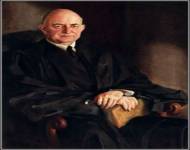Early Life
Stanley Forman Reed was born December 31, 1884 in Maysville, Kentucky. Growing up in a rural area, Reed enjoyed an affluent upbringing because his father was a wealthy physician.
Reed attended Kentucky Wesleyan College and earned his bachelor of arts in 1902. Reed earned a second undergraduate degree from Yale University in 1906.
After earning his undergraduate degrees, Reed studied law at the University of Virginia, Columbia University, and Paris’ Sorbonne University. Despite his attendance, Reed never earned his law degree. Yet, in 1910, Reed was admitted to the bar and started a private practice in eastern Kentucky.
Career
Reed practiced as a sole practitioner until his election as congressman to the Kentucky House of Representatives. From 1912-1916, Reed served as a member of the Kentucky state congress. After his term, Reed enlisted in the Army and served in the intelligence division during World War I.
Following the war, Reed joined a Kentucky law firm. While at the firm, Reed served as counsel to the Burley Tobacco Growers’ Association, which led to his appointment to the Federal Farm Board. In 1932, President Herbert Hoover appointed Reed as general counsel of the Reconstruction Finance Corporation.
In 1935, following the election of Franklin Delano Roosevelt, Reed was appointed as United States Solicitor General. Reed’s primary responsibility was to argue the constitutionality of many New Deal programs instituted by President Roosevelt. Reed won eleven of the thirteen cases he argued in front of the Supreme Court. However, one of Reed’s losses dealt a huge blow to New Deal legislation. In Schechter Poultry Corp. v. United States, 295 U.S. 495 (1935), the Court held the National Recovery Act unconstitutionally delegated legislative power to the President because the law did not establish the standards to assess industrial activity, instead allowing the President to unilaterally create the codes and rules.
The loss in Schecter Poulty Corp. led to President Roosevelt’s “court-packing” idea. Subsequently, Roosevelt nominated Reed to the United States Supreme Court. Reed was confirmed by the Senate and took his oath on January 31, 1938.
Supreme Court
Reed was a New Deal supporter and believed the government was allowed to regulate the economy. In United States v. Rock Royal Co-operative, Inc., 307 U.S. 533 (1939), Reed authored the majority the Agriculture Marketing Agreement Act regulation of milk handlers and the setting of minimum prices was not unconstitutional because the act regulated interstate commerce and did not infringe on intrastate commerce. Similarly, in United States v. Appalachian Electric Power Co., 311 U.S. 377 (1940), Reed wrote the majority opinion, which expanded federal oversight of inland waterways and power sources.
Reed helped the desegregation movement through three decisions: Smith v. Allwright, 321 U.S. 649 (1943); Morgan v. Virginia, 328 U.S. 373 (1946); Brown v. Board of Education, 347 U.S. 483 (1954).
In Smith v. Allwright, a Texas state law allowed the Democratic Party to set its own internal rules for elections and the party used this power to establish “white primaries” where African American were prohibited to vote in the nomination of candidates. Reed penned the majority holding the restrictions against African American violated the Fifth Amendment because party primaries were conducted under state statutory authority and a state could not allow a private organization to institute racial discrimination in elections.
Three years later, Reed wrote the majority opinion in Morgan v. Virginia. The majority held Virginia’s law of seating segregation on interstate buses interfered with commerce and interstate travel; therefore, Virginia’s law was struck down in its application to segregation on interstate bus travel. However, the court did not rule on segregation on intrastate transportation.
Further, Reed joined the majority in Brown v. Board of Education, which ended racial segregation in public schools.
On February 25, 1957, Reed retired from the United States Supreme Court. He was replaced by Justice Charles E. Whittaker.
Later years
After retirement, President Dwight Eisenhower appointed Reed as chairman of the Civil Rights Commission; however, Reed held the position briefly. In addition, Reed served as a temporary judge on the District of Columbia Circuit.
Reed died on April 2, 1980 in Huntington, New York.









